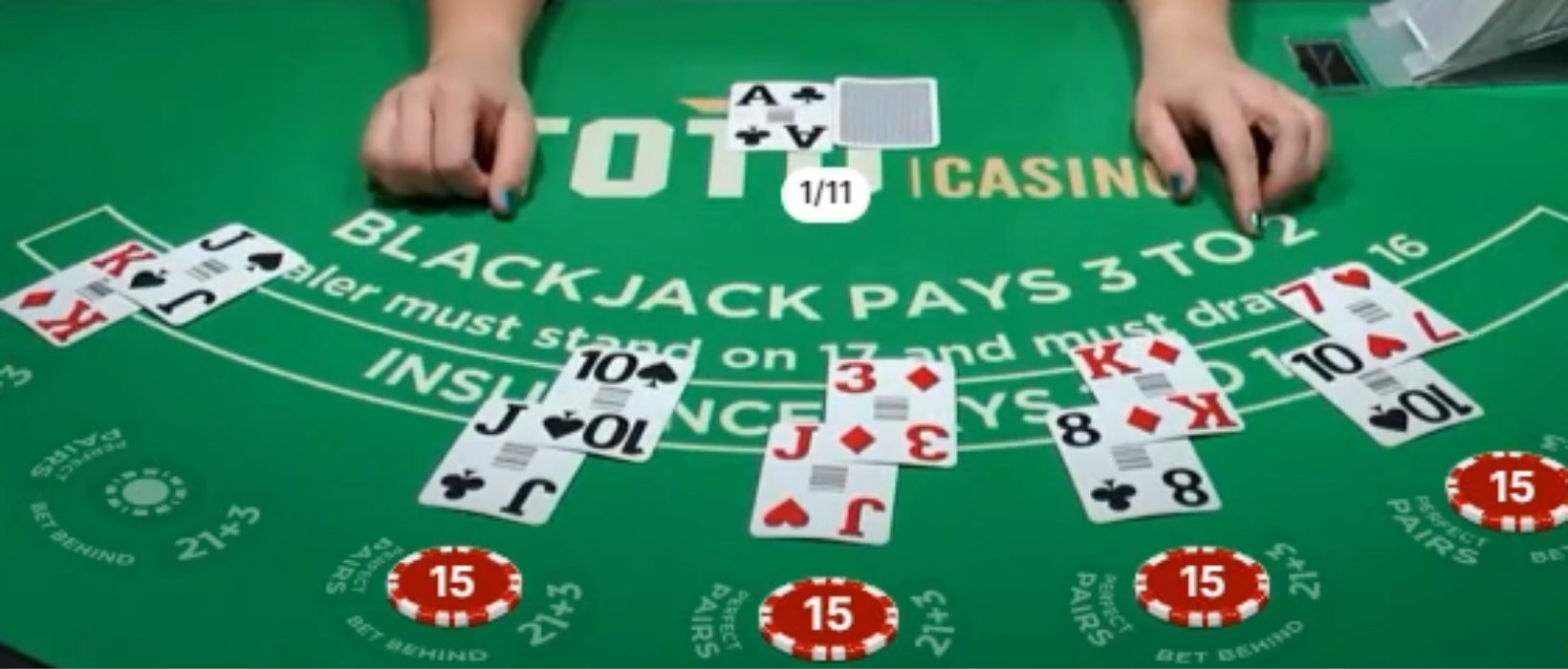Ever sat down at a Blackjack table, placed your bet, and been offered “insurance” when the dealer shows an Ace? It sounds tempting, a safety net in case they’re hiding Blackjack. But is Blackjack insurance really a friend to the player, or is it a sneaky trick up the dealer’s sleeve?
In this blog post, we’ll break down what insurance is, how it works, and why most players should probably skip it. We’ll talk about the odds, the logic behind basic strategy, and how to make the best decisions at the table to boost your chances of winning. So, grab a seat, deal yourself in, and let’s talk about the truth about Blackjack insurance!
Blackjack insurance is a side bet offered to the player only when the dealer’s up card is an Ace. It’s essentially a hedge against the possibility of the dealer having Blackjack (an Ace and a ten-value card for a total of 21).
Here’s how it works:
- The dealer shows an Ace: This is the key condition for insurance to be offered.
- You decide: You can either decline the insurance and play your hand normally, or accept the insurance by placing a separate bet (usually up to half your original bet) on the designated area on the table.
- Payout: If the dealer does have Blackjack, your original bet loses, but you win on your insurance bet at 2 to 1 odds. This means you get your insurance bet amount back, plus double that amount (e.g., if you bet €10 on insurance, you win €20).
- If the dealer doesn’t have Blackjack: You lose your insurance bet, and the game continues as usual.
Insurance in Blackjack is a tempting but ultimately bad side bet. Here’s why you, as a strategic Blackjack player, should avoid it:
High cost, low payout
Insurance typically costs half your original bet, but it only pays 2 to 1 if the dealer has Blackjack. This means you need the dealer to have Blackjack more than a third of the time to break even, which statistically isn’t likely.
It doesn’t affect the original bet
Even if you win the insurance bet, you still lose your original wager if the dealer has Blackjack. Insurance is a separate bet, not a hedge on your main hand.
Worse odds than basic strategy
Basic strategy, like hitting a 16 against a dealer’s 10, already factors in the possibility of the dealer having Blackjack. Taking insurance disrupts this strategy and offers a worse payout in the long run.
Imagine you have a 16 and the dealer has a 10 showing. According to basic strategy, you should hit in this scenario. This is because the odds are higher that you’ll improve your hand than bust (go over 21).
Now, consider taking insurance with this same situation. The insurance bet assumes the dealer has a 10-value card hidden (making Blackjack), but it ignores the possibility of any other card value the dealer might have.
Here’s where basic strategy shines:
- It accounts for all possibilities: When you stick to basic strategy, you’re essentially making the best decision based on the average outcome of all possible dealer hidden cards, not just the one “assumed” scenario with insurance.
- It optimizes your long-term winnings: By considering all possibilities, basic strategy helps you make choices that lead to better overall returns over time, even if the dealer gets Blackjack occasionally.
Taking insurance disrupts this by focusing solely on the dealer having a 10, which statistically isn’t the most likely outcome. You end up making a bet with worse odds than the one basic strategy suggests, potentially reducing your long-term winnings.
Think of it like this: basic strategy is a well-balanced recipe that considers all the ingredients (dealer cards, your hand) to create the best outcome on average. Insurance, on the other hand, is like adding an extra, unnecessary ingredient that might ruin the whole dish.
Reduces your overall winnings
Every dollar you spend on insurance is a dollar you can’t win on your original bet. If your basic strategy play wins, you lose out on potential bigger payouts by taking insurance.
In short, insurance is a sucker bet for casual players. It might seem like a safety net if the dealer has an Ace, but the odds are stacked against you. Focus on mastering basic strategy to make the most informed decisions at the Blackjack table.


Римские шторы на заказ — выбор профессионалов
римские шторы на заказ римские шторы на заказ .
Пошив штор для вашего дома, на нашем сайте.
Сшейте уникальные шторы, для вашего дизайна.
Шторы на заказ, для любого интерьера.
Идеи для пошива штор, которые вдохновят вас.
Уроки для новичков по пошиву штор, без сложностей.
Идеальные ткани для штор, и бюджетом.
Модные тренды в пошиве штор, вашему интерьеру.
Советы по декорированию штор, и поднимали настроение.
Кулинарные шторы, как выбрать.
Как создать атмосферу в спальне, пошаговая инструкция.
Шторы для гостиной, по вашему вкусу.
Советы по уходу за шторами, чтобы они оставались свежими.
Как выбрать стиль для штор, на любой вкус.
Как сшить римские шторы, для вашего окна.
Почему стоит выбрать функциональные шторы, и защиты от солнца.
Идеи для штор на люверсах, которые легко монтируются.
Как выбрать шторы для детской комнаты, чтобы создать уютное пространство.
Как сшить шторы без усилий, в наших статьях.
сшить шторы сшить шторы .
Создание римских штор своими руками, чтобы.
Пошив римских штор: пособие
пошить римские шторы пошить римские шторы .
Узнайте, как сделать римские шторы, освежить.
Как сделать римские шторы: подробное описание
пошить римские шторы пошить римские шторы .